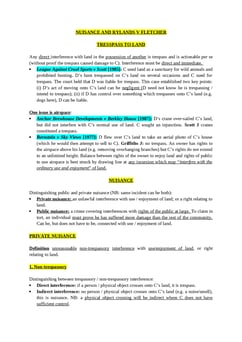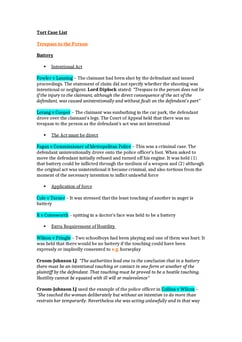Donoghue v Stevenson [1932] AC 562
Judgement for the case Donoghue v Stevenson
KEY POINTS
The "neighbour principle" established a duty to take reasonable care to prevent foreseeable harm to those directly affected by one's actions or omissions. This "neighbour" is not just someone in physical proximity but anyone who could be reasonably contemplated as being affected by one’s actions.
FACTS
The appellant consumed a bottle of ginger beer given by a friend, only to discover decomposed snail remains after drinking most of it. She claimed to have suffered shock and gastro-enteritis as a result.
She argued that the manufacturer, the respondent, had a duty to ensure the product's safety, as it was intended for consumption and couldn't be inspected.
Her case contends that the respondent's negligence in fulfilling this duty makes them liable for the resulting harm.
COMMENTARY
Lord Atkin's stance suggests that public opinion supports imposing liability for negligence to ensure just outcomes when harm is foreseeable.
The case laid a foundation for the modern understanding of duty of care, emphasizing foreseeability, moral considerations, and the broader concept of a "neighbour".
ORIGINAL ANALYSIS
A manufacturer (R) sold bottles of drink to a café which sold them to customers.
One bottle contained a snail and made Plaintiff ill when she drank it.
Case in HL determined whether R had a legal duty to Plaintiff and thus whether a case could be brought.
-
HL said there was a legal duty, establishing
That manufacturers have a duty to take care for their consumers and
That R must take “reasonable care to avoid causing foreseeable injury”.
Lord Atkin
Negligence
You must take reasonable care to avoid acts or omissions which you can reasonably foresee would be likely to injure your neighbour.
-
He defines “neighbour” as people who are “so directly affected” by my act or omission that I “ought reasonably to have them in contemplation as being so affected” when I undertake the act/omission.
This is the meaning of the “proximity” doctrine i.e. not merely physical proximity.
He takes moral perspective: It is wrong that a person who consumes the product and is harmed due to R’s negligence should be left without remedy as would happen if there were no contract/warranty involved, i.e. if the consumer is not the purchaser, as here.
Finally he says that liability for negligence has public support.
Lord Macmillan
To whom was the duty owed? All “potential consumers” of his product.
Liability occurs where a reasonable man would have foreseen, and could have avoided the consequences of his act/omission
-
Circumstances will always dictate whether:
There was a duty of care and
To whom it was owed.
NB where the product was intended to reach the consumer in the condition in which the manufacturer sold it, and it was so, the manufacturer is liable, as in this case.
However if intermediary parties “have the means and opportunity” to examine it, then the manufacturer’s liability ceases (not this case).
Negligence has to be proved by Plaintiff and it has to be shown that the thing was in a state capable of causing injury at the point when it left the manufacturer. The burden is on Plaintiff, and res ipsa loquitur doesn’t apply.
Lord Macmillan said that “the categories of negligence are never closed”.
RELATED CASES
For Further Study on Donoghue v Stevenson

Tort Law notes fully updated for recent exams at Oxford and Cambridge. ...
Need instant answers? Our AI exam tutor is here to help.
Ask questions 🙋 Get answers 📔 It's simple 👁️👄👁️
Our AI is educated by the highest scoring students across all subjects and schools. Join hundreds of your peers today.
Get StartedSimilar Cases
Related Product Samples
These product samples contain the same concepts we cover in this case.
| GDL Tort Law | Duty Of Care Notes (9 pages) |
| Tort Law | Negligence Duty Of Care Notes (35 pages) |
| Tort Law | Negligence Law Notes (20 pages) |

 Since 2010, Oxbridge Notes has been a trusted education marketplace, supplying high-quality materials from top achievers at universities like Oxford, Cambridge, LSE, Harvard, and Yale.
Since 2010, Oxbridge Notes has been a trusted education marketplace, supplying high-quality materials from top achievers at universities like Oxford, Cambridge, LSE, Harvard, and Yale.